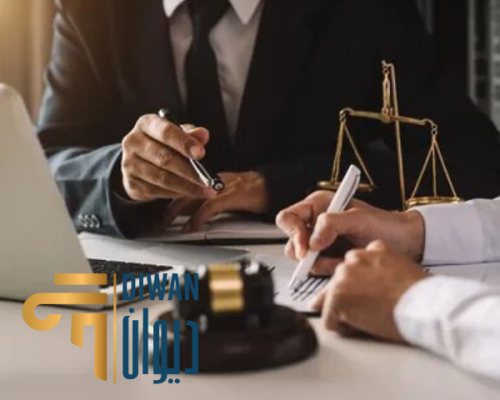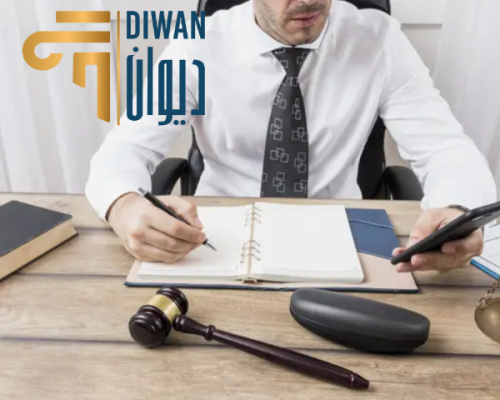عندما يقرر شخص الشروع في تأسيس منشأة فردية، يتعين عليه أداء العديد من الخطوات والإجراءات القانونية، ومن بين الخطوات الأساسية التي يجب اتباعها، هو استشارة محامي مختص في الشؤون القانونية المتعلقة بالأعمال، ويعد مكتب ديوان هو الجهة الأمثل للاستعانة بها في هذه الحالة، لأنه يقدم لك عدة معلومات تهمك عن المنشأة الفردية، كما يمتلك المحامون الخبرة والمعرفة اللازمة لمساعدتك على تأسيس المنشأة بطريقة قانونية ومنظمة، بشكل لا يتعارض مع القوانين والتشريعات المحلية.
معلومات تهمك عن المنشأة الفردية
المنشأة الفردية في مصر تعتبر نوعًا من الشركات الصغيرة التي يتم تأسيسها وإدارتها بواسطة شخص واحد فقط وهو المسؤول الوحيد عنها قانونياً ومالياً وهي من الأشكال الشائعة للأعمال التجارية في مصر نظراً لسهولة الإنشاء والإدارة وقلة المتطلبات المالية وسوف نوضح خطوات إنشائها فيما يلي:
اختيار الاسم التجاري يجب اختيار اسم تجاري مناسب وغير مكرر، كما يجب التأكد من عدم استخدام الاسم من قبل منشأة أخرى.
الحصول على البطاقة الضريبية يجب تقديم طلب للحصول على البطاقة الضريبية من مصلحة الضرائب.
التسجيل في السجل التجاري يجب تقديم طلب التسجيل في السجل التجاري، حيث يتطلب التسجيل تقديم بعض الوثائق مثل صورة البطاقة الشخصية وصورة عقد الملكية أو الإيجار وموافقة أمنية إذا كانت المنشأة تعمل في مجالات محددة.
فتح حساب مصرفي يجب فتح حساب مصرفي باسم المنشأة لدفع الضرائب والمستحقات المالية الأخرى.
استخراج التراخيص اللازمة يعتمد نوع التراخيص المطلوبة على نوع العمل الذي تنوي القيام به، مع العلم أنه قد تحتاج للتقديم على تراخيص خاصة من الهيئات المعنية مثل وزارة الصحة، إذا كان العمل يتضمن منتجات طبية، أو وزارة الصناعة إذا كان العمل يتضمن إنتاج أو تصنيع معين.
شاهد أيضا: مميزات و عيوب المنشأة الفردية

معلومات تهمك عن المنشأة الفردية
ما هي أهم مميزات المنشأة الفردية
لا يمكن تقديم معلومات تهمك عن المنشأة الفردية دون ذكر أهم مزايا ذلك النوع من الشركات والذي يتمثل فيما يلي:
- السهولة في التأسيس: يمكن للفرد تأسيس منشأة فردية بسهولة و بتكاليف منخفضة مقارنة باستئجار العمال أو إنشاء شركة مساهمة.
- المرونة: يمكن لصاحب المنشأة الفردية اتخاذ القرارات بسرعة دون الحاجة لموافقة شركاء آخرين، وهذا يزيد من قدرته على التكيف مع التغيرات في السوق.
- السرية: تتمتع المنشأة الفردية بمستوى عالٍ من السرية فيما يتعلق بالعمليات التجارية والأرباح، حيث لا يلزم صاحبها الكشف عن تفاصيل مالية لشركاء أو مساهمين آخرين.
- التحكم الكامل: يمكن لصاحب المنشأة فردية أن يدير الشركة بشكل كامل وفقًا لرؤيته الخاصة وأهدافه، دون التدخل من الشركاء الآخرين.
- الاحتفاظ بالأرباح: يتمكن صاحب المنشأة الفردية من الاحتفاظ بجميع أرباح الشركة دون الحاجة لتقاسمها مع شركاء آخرين.
- سهولة الإدارة: بسبب حجم الشركة الصغير، يكون إدارة المنشأة الفردية أكثر سهولة ويسرًا مقارنة بالشركات ذات الهياكل الكبيرة.

معلومات تهمك عن المنشأة الفردية
ما هي أهم عيوب المنشأة الفردية
نستكمل توضيح معلومات تهمك عن المنشأة الفردية من خلال توضيح العيوب، حيث لا يخلو ذلك النوع من المؤسسات من العيوب التي سوف نذكرها فيما يلي:
مسؤولية غير محدودة: في المنشأة الفردية، يتحمل المالك جميع المسؤوليات المالية والقانونية، أي ديون أو التزامات مالية تقع على عاتق المالك يمكن أن تؤثر على أمواله الشخصية.
صعوبة في جذب الاستثمارات: يمكن أن يكون من الصعب على المنشأة الفردية جذب المستثمرين أو الحصول على قروض من البنوك، حيث يرون أن الاستثمار في شركة ذات مسؤولية فردية يعد مخاطرة كبيرة.
محدودية النمو والتوسع: قد تواجه المنشأة الفردية صعوبة في التوسع بسبب اعتمادها الكبير على رأس مال المالك وخبرته الشخصية.
قصر الحياة الاقتصادية: بنية المنشأة الفردية ترتبط بشكل رئيسي بحياة المالك، وإذا توفي المالك أو قرر التوقف عن العمل، قد تتوقف المنشأة عن العمل أو يتم نقلها إلى شخص آخر بموجب قانون الإرث.
الاعتماد الكبير على المالك: تعتمد العمليات اليومية والقرارات الهامة على فرد واحد، مما يمكن أن يؤدي إلى استنزاف الطاقة وإنهاك المالك.
عدم وجود مرونة في الإدارة: بوجود مالك واحد، يمكن أن تكون عملية اتخاذ القرارات بطيئة أو غير شاملة، مما قد يؤدي إلى فقدان فرص أو اتخاذ قرارات غير مدروسة.
صعوبة الحصول على مهارات متنوعة: في المنشآت الكبيرة، يتم توظيف مجموعة متنوعة من الأفراد بمهارات مختلفة، لكن في المنشأة الفردية، تكون المهارات محدودة بقدرات المالك أو العمال المتاحين.
رأس المال: النمو والاستدامة المالية قد يكونان محدودين بسبب عدم وجود شركاء يضخون رؤوس أموال إضافية.
اقرأ أيضا: اجراءات تأسيس منشأة فردي
الخدمات التي يقدمها مكتب ديوان في تأسيس المنشأة الفردية
عند تأسيس منشأة فردية، يواجه الأفراد العديد من الإجراءات القانونية والإدارية التي قد تكون معقدة وتستغرق وقتًا وجهدًا. لذا، يلجأ الكثيرون إلى الاستعانة بمكاتب المحاماة حتى يقدم لهم الخدمات التالية:
- الاستشارات القانونية يقدم المحامي استشارات أولية حول الهيكل القانوني المناسب للمنشأة الفردية، بما في ذلك النصائح حول الالتزامات القانونية والضرائبية.
- تحضير وصياغة الوثائق يستطيع المحامي إعداد جميع الوثائق اللازمة لتأسيس المنشأة، مثل عقود التأسيس والنظام الأساسي، والتأكد من أن جميع الوثائق تلتزم بالمتطلبات القانونية والتنظيمية.
- التسجيل والتراخيص المساعدة في تسجيل المنشأة لدى الجهات المختصة، والحصول على التراخيص اللازمة لمزاولة الأنشطة التجارية، حيث يمكن للمحامي القيام بتقديم الطلبات والمتابعة مع الجهات الحكومية حتى إتمام الإجراءات.
- التفاوض وتوقيع الاتفاقيات القيام بالتفاوض حول عقود الإيجار، والموردين، والعملاء، والتأكد من حماية مصالح العميل ونص صياغات عادلة للعقود.
- الامتثال والمتابعة القانونية مراقبة الامتثال للقوانين واللوائح المعمول بها، بما في ذلك القوانين التجارية والضريبية والعمالية، وتقديم المشورة اللازمة لتجنب العقوبات.
- حل النزاعات تقديم الدعم القانوني في حال وجود نزاعات قانونية أو تجارية، سواء كانت مع العملاء أو الموردين أو الجهات الحكومية، والعمل على حسم النزاعات بأسرع وقت ممكن.
- الاستشارات الضريبية مساعدة في فهم وتطبيق اللوائح الضريبية، وتقديم الاستشارات حول الأمور الضريبية لتجنب الوقوع في مخالفات ومشاكل ضريبية مستقبلية.
- التوسع والتطوير تقديم المشورة حول إجراءات التوسع والتطوير، بما في ذلك دمج الأنشطة التجارية الجديدة، وتوسيع نطاق الأنشطة، والدخول في شراكات تجارية.
الفرق بين شركة الشخص الواحد والمنشأة الفردية
آخر ما نذكره في حديثنا عن بعض معلومات تهمك عن المنشأة الفردية هو الفرق بين ذلك النوع من الشركات وبين شركة الشخص الواحد والذي يتمثل فيما يلي:
أولًا: شركة الشخص الواحد
تعتبر شركة الشخص الواحد من الأشكال القانونية التي يمكن للشخص الواحد أن ينشئها ويديرها، وتكون مملوكة بالكامل من قبل الفرد الواحد، لكن يتم تعتبر شركة الشخص الواحد ككيان قانوني منفصل عن صاحبه.
يتحمل صاحب الشركة مسؤولية مالية محدودة عن الديون والخسائر التي قد تتكبدها الشركة يجب تسجيل شركة الشخص الواحد وفقًا للقوانين المحلية والمرافق الضريبية لتشغيل الأنشطة التجارية.
ثانيًا: المنشأة الفردية
المنشأة الفردية هي هيكل تجاري يتمتع بالاستقلالية والقابلية للتنفيذ لكنه غير مملوك بشكل قانوني، ولا تعتبر المنشأة الفردية ككيان قانوني منفصل عن صاحبه.
يتحمل صاحب المنشأة الفردية المسؤولية الكاملة عن الديون والخسائر التي تتكبدها المنشأة، ويعنى هذا أن جميع أصول صاحب المنشأة يمكن أن تستخدم لتعويض الديون.
لا يتطلب تأسيس المنشأة الفردية تسجيلها بنفس الشكل الذي تتطلبه شركة الشخص الواحد.
قدمنا عدة معلومات تهمك عن المنشأة الفردية والجدير بالذكر أن عند الاستعانة بمكتب محامي متخصص ولديه خبرة قانونية فإنه سوف يقدم لك النصائح اللازمة لضمان تنفيذ الإجراءات بشكل سليم وسلس، ويساعدك في إعداد العقود والوثائق القانونية الضرورية، وتوفير الدعم اللازم خلال عملية التأسيس.








